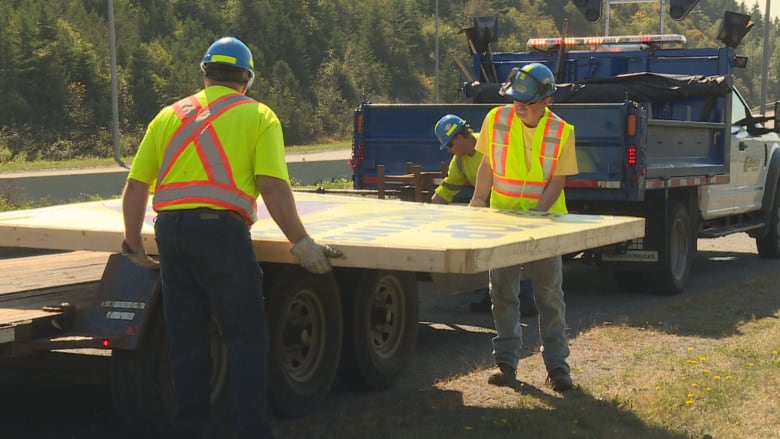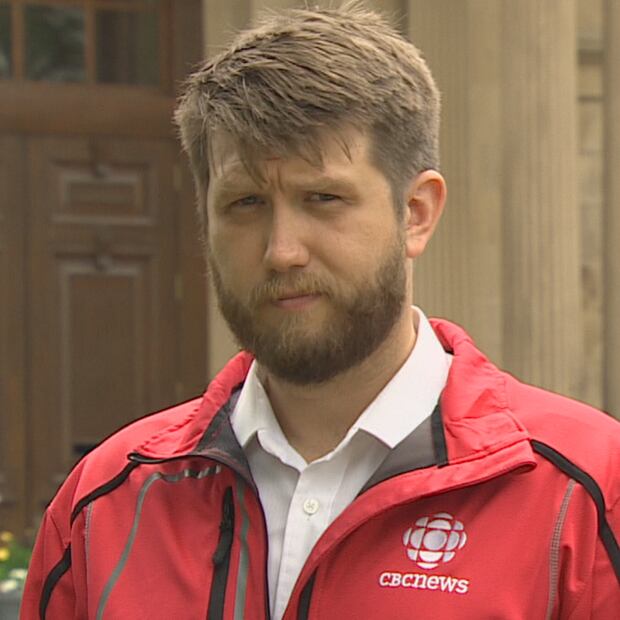How herbicide spraying in N.B. became an election issue
Stop Spraying New Brunswick's members have fought for years to make their issue an election talking point

Caroline Lubbe-D'Arcy stares down at a large yellow sign lying flat in the grass as highway traffic roars by.
The black bold words exclaim "Stop Spraying New Brunswick" in all capital letters, but the flurry of drivers rushing by can't see them.
Lubbe-D'Arcy wishes the 2.5-metre-square billboard was standing upright where she left it last week, among the signs of provincial election candidates.
She's just happy it's back.
Last week highway maintenance workers tore the billboard down and hauled it away, mistaking it for an illegal sign.
But Lubbe-D'Arcy and the Stop Spraying New Brunswick group went through all the proper channels to register SSNB as a third party in this fall's election. By doing so, they are allowed to put up billboards — an important step to publicizing their concerns about herbicide spraying.

The highway company Gateway apparently didn't get the memo, but they did return the sign on Friday.
They didn't put it back into place, instead opting to leave it on the side of the road under other election signs in the Rothesay riding, where it is visible only to the smiling head of Stephanie Tomilson and the confident grin of incumbent Ted Flemming.

Lubbe-D'Arcy can't lift the heavy sign by herself. Instead, it was returned by three men in a full-size Gateway truck on a large trailer.
But she says volunteers would be along soon to help reinstate it.
"I feel that people feel really empowered by this campaign and that's why it's been really easy to find people to help with these billboards," Lubbe-D'Arcy said over the traffic.
Chemical controversy
The province allows forestry companies and NB Power to use the spray to prevent plant growth.
Forestry companies often use herbicides to prevent the growth of certain species of tree to encourage the growth of select softwoods.

NB Power uses glyphosate products to inhibit plant growth under transmission lines, but other jurisdictions have cracked down on its use.
Last year, the state of California placed glyphosate on a list of cancer-causing chemicals. Quebec has also banned its use.
Years of planning
Lubbe-D'Arcy has worked to make the spraying of glyphosate and other herbicides in New Brunswick a campaign issue since 2015.
The Stop Spraying New Brunswick campaign is funded by the sale of lawn signs that can now be found in every corner of the province. The yellow and red plastic boards usually sport the silhouette of a whitetail deer and cost customers between $11 and $15.
And it appears to be working.

Lubbe-D'Arcy, armed with more than 35,000 signatures protesting the use of herbicides, now has the support of three political parties in this fall's election.
The Green Party of New Brunswick has made an election promise to "immediately end the spraying of herbicides [glyphosate] on forest lands and under power lines, given the risks the chemical poses to natural ecosystems and wildlife."
As one of their campaign statements, the NDP says the party "would end glyphosate spraying, protect older growth forests and implement the best forestry practices to protect and carefully develop our forestry resources."
And People's Alliance Leader Kris Austin says the people he's spoken to are fearful of the practice.
"We see it on the ground," said Austin. "We hear it a lot in rural areas. They have big concerns about the spraying in particular, and I feel it's time to ban it."
No red or blue support
But the province's two largest parties, the Liberals and the PCs, have both been OK with the spraying of herbicide in the past. Neither party is promising to stop its future use.
For those opposed to the spraying, it's just another indication that the big guys don't care.
"I just want government to listen to the people," Lubbe-D'Arcy said. "Stop always just listening to corporations and what they want. Think about the people."
Subscribe to our election newsletter
Get the latest election updates delivered right to your inbox with The 506er. Subscribe here.

